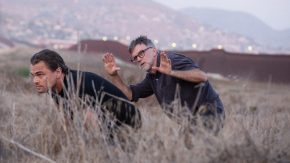Can someone be a classical composer if he plays in a hardcore band that has “shit” in its name? Or who invents a new instrument with robots playing on it? And who writes soundtrack for Hunger Games? And what about a man who dislikes being called “classical”, but everything listed above fits him, and a lot more as well? Meet Ólafur Arnalds and his absolutely nonconventional career.
Setting Heaven on fire
In the early 2000s, Ólafur Arnalds played in a hardcore band called Adapt. Once they performed as the opening band on the German group Heaven Shall Burn’s concert. The Icelandic boy, only sixteen years old, could hardly believe that he can meet his heroes. In the backstage, he plucked up all his courage and gave the guitarist a demo with tracks inspired by Heaven Shall Burn. He might have been the most surprised when the German band came back to him: they liked the demo very much, would Ólafur write intros and outros of this kind for their next album? The boy felt totally honored and started to work on the music, which was indeed used on the group’s 2004 album Antigone.
One funeral, one christening
This started something. Shortly thereafter, a record company called Ólafur if he wanted to create a whole album with music like the intros and outros on the Antigone. Oddly enough, Ólafur has just left his music theory and composing studies at university after one mere year. He didn’t like the closed and elitist world of classical music and the way it despised other musical genres and expressions. Apart from this, he toured with hardcore bands Fighting Shit and Celestine, so he also didn’t have time to study. With the invitation of the record company, however, he just stood in front of a successful career as a classical composer. Then a family tragedy occurred, and it gave Ólafur the final push to express his swirling thoughts through music:
“He was the first person really close to me who’d died, and gone before his time. It changes your perspective on everything. […] Months later his first grandson was born and was given his name, so it was that circle of life pattern which inspired the album.”
Number Seven
With the first album, Ólafur Arnalds’ career started: wrote more songs, cooperated further with Heaven Shall Burn and toured with Sigur Rós. Drumming in Fighting Shit and composing were going hand in hand in his life, but then he also started to get requests for film and theatre music, so he had to give up on touring with the hardcore band – not because the loss of interest but the lack of time:
“Yeah, it’s not really much of a transition. It’s not that I stopped doing that and started doing this, it was just about expanding the horizon and doing more. You can’t just spend your life doing one thing, y’know?”
What exactly has he done? For instance, he had a new idea in 2009: he recorded a song every day for seven days and put it online within 24 hours. This became the collection Found Songs. In 2010, he published his new studio album, And They Have Escaped The Weigh of Darkness – it has a structured conception and positive tone, as if he wanted to counterweight the melancholy of the first album. In 2011, he created another collection within seven days, which was named Living Room Songs. The third album (For Now I Am Winter) came two years later, and in 2016 he travelled to seven different places in Iceland to cooperate seven different artists for seven weeks. This resulted in Island Songs, the most recent one of his “seven” collections, all of them still available online.
Music from the silence
In Ólafur’s life, everything revolves around music. He doesn’t really have time to go out, only for concerts. Nowadays he’s been exploring South East Asia, that’s where he goes to regenerate from his busy days, but music accompanies him there in some certain form, too. This year, he visited the New Year’s Feast in Bali with his friends. There was no public transportation outside and electricity inside, no television, no noises, only Ólafur was playing the piano. The spontaneous experience not only inspired his newest album’s last song, but also a new worldview: Ólafur learned to meditate, to hear the message of silence, to get back to his inner calmness, and even to smile on photographs heartily:
“I know now that I don’t have to be the serious artist all the time. It makes me happy what I do, even if the songs sound often sad.”
The newest album, re:member, looks like a conclusion of this experience. Ólafur worked on the title song for two weeks – the longest time he’s ever spent with one song. He admitted himself lately that since his career started, he struggled harder and harder to meet external expectations, but it might lead to lose his artistic identity and his inner voice. So re:member means not only recalling memories, but also a new covenant to himself, a promise that he won’t leave his own path anymore, no matter where it leads.
A new instrument with robots
Another speciality of the new album is that it features works of the STRATUS project. This might be his most adventurous idea of all, because he had to create a new instrument, a fruit of two years of preparations. STRATUS, debuted on International Piano Day, consists a piano that Ólafur plays, and two others playing themselves, reinterpreting the melody with the help of an artificial intelligence. It’s like three musicians improvising, but two of them are not humans but robots. They always surprise Ólafur himself with their solutions. His original plan was to use musical ideas of robots that he would have never thought of, but STRATUS grew even bigger: we can see it as a new invention, a very modern instrument that Müpa’s audience can also get to know in October as a part of the CAFe Budapest Contemporary Arts Festival, alongside more songs from re:member and Ólafur’s other works.
So, is Ólafur Arnalds classical? Even if he doesn’t like this label right now, he can’t escape his destiny… In hundred, two hundred, five hundred years, it won’t be a question anymore.
Sources for this article:
https://www.thejackalmagazine.com/olafur-arnalds-interview/
https://www.musikexpress.de/so-war-der-me-talk-mit-olafur-arnalds-1068509/
http://thequietus.com/articles/04510-olafur-arnalds-interview

























Comments
1 Responses to “The expanding horizon of Ólafur Arnalds – from hardcore to musical robots”